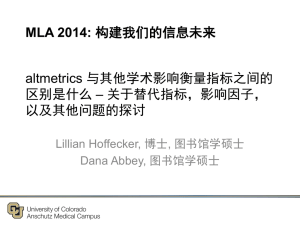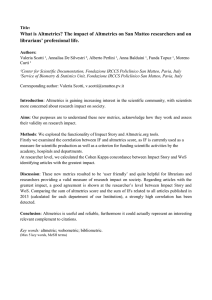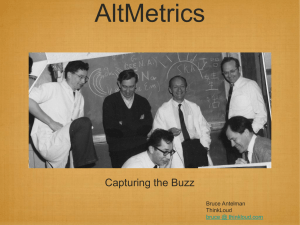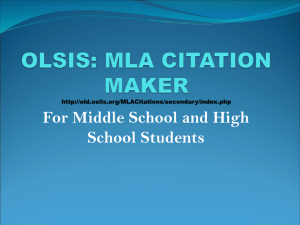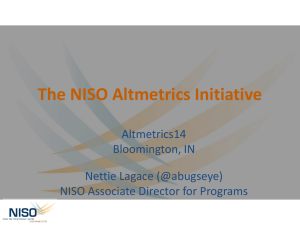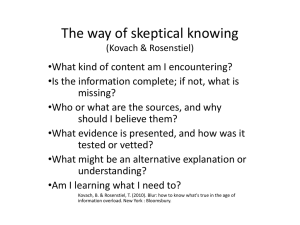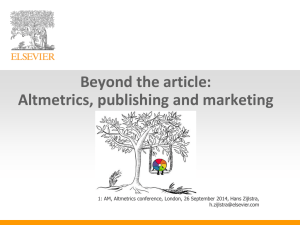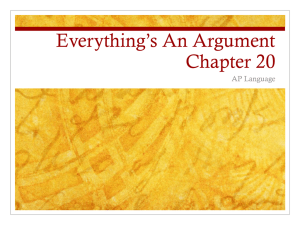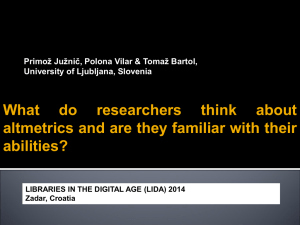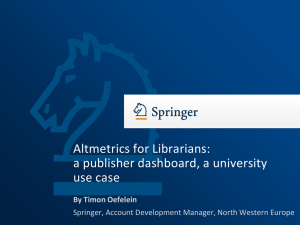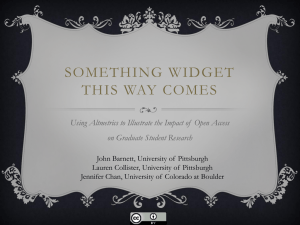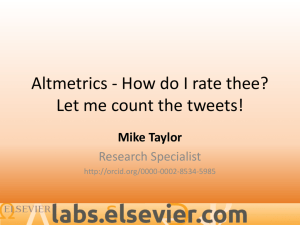Document
advertisement
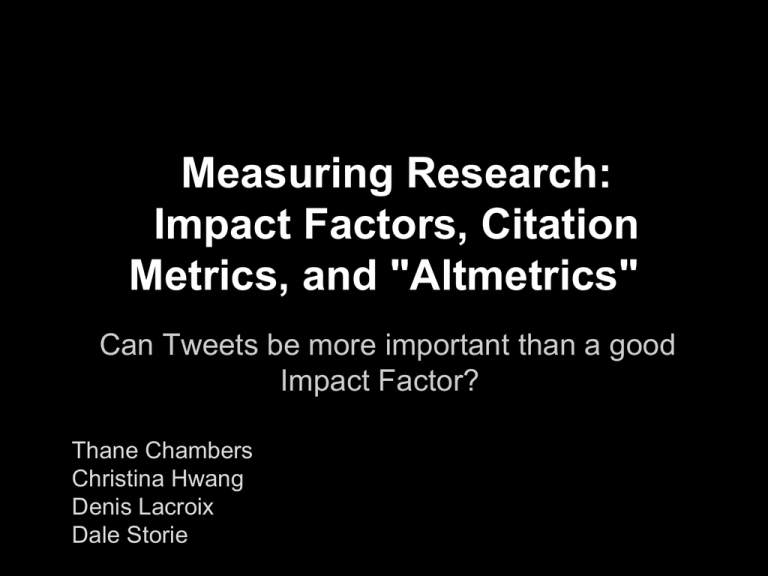
Measuring Research: Impact Factors, Citation Metrics, and "Altmetrics" Can Tweets be more important than a good Impact Factor? Thane Chambers Christina Hwang Denis Lacroix Dale Storie Who Cited Whom? Citation tracking is a traditional measure of research impact: • • Measure the research output of an author Measure the popularity or influence of a journal or article. Metrics can measure: • • • Journal-level metric: o Impact Factor, Eigenfactor, SJR, SNIP Author-level metric: o h-index, i10-index Article or book-level metrics: o citation counts, "altmetrics" Impact Factor • “calculated by dividing the number of citations in the [Journal Citation Reports] year by the total number of articles published in the two previous years” Impact Factor: # of citations in 2011 _______________________________ # of articles published in 2009 & 2010 Journal Citation Reports Exercise: What is the Impact Factor for • o o o • New England Journal of Medicine Nature Canadian Journal of Fisheries and Aquatic Sciences Find the history journal with the highest Impact Factor? h-index If you have 5 papers with 5 citations, your hindex = 5. h-index • Benefits longer careers o A scientist who has been working in the field for 30 years will have a higher index than someone with 10 years. • Can be used to compare scholars at similar points in their career who publish in the same discipline. Scopus/Web of Science/Google Scholar Exercise What is the h-index for: Faith Davis (Public Health Sciences) Mike Belosevic (Biological Sciences) Andy Knight (Humanities) • • • Importance of citation metrics • Determine influence of a journal (Impact Factor), author, publication. • Faculty evaluation, promotion, merit, tenure • Grant applications Case Study: Faculty of Nursing http://bit.ly/UyeNNW Altmetrics • New metrics made possible by the Web and open access: o o o # of downloads # of Tweets # of Shares in social media services, including academic tools such as Mendeley or CiteULike. Altmetrics impactstory.com altmetrics.org Public Library of Science (PLoS) article-level metrics ALTMETRICS FOR THE HUMANITIES AND SOCIAL SCIENCES Denis Lacroix ALTMETRICS FOR CITATION PROJECT • Only a fraction of HSS journals have an impact factor • Fields of study in the humanities are often small • Humanities publishing takes on many forms Book Citation Index Google Scholar / Publish or Perish Search bibliographies in databases for cited works (e.g. CAIRN, Erudit) • Authority control Crossref.org’s Cited-by linking Researcher ID (Thomson Reuters) • Social Web: PLOS, Mendeley, CiteULike, Facebook, Twitter, Research blogging, Wikipedia, SlideShare… Impact Story (http://impactstory.org/) Altmetric Explorer (www.altmetric.com) & Altmetric It bookmarklet ReaderMeter – Mendeley altmetrics (http://readermeter.org/) ALTMETRICS AND THE SOCIAL WEB • Citations no longer represent adequately how an article is used (NISO Webinar: Beyond Publish or Perish: Alternative Metrics for Scholarship) Document downloading and viewing Academia.edu SSRN (Social Science Research Network) Mendeley: metrics on views & downloads VIVO: Semantic Web Application Library ownership of faculty publications OCLC WorldCat CITATION ANALYSIS AND THE HUMANITIES • Hammerfelt, Bjorn. Following the Footnotes: A Bibliometric Analysis of Citation Patterns in Literary Studies. PhD Thesis. Uppsala Universitet, 2012. • Howard, Jennifer. “Tracking Scholarly Influence Beyond the Impact Factor.” Chronicle of Higher Education. Wired Campus (28 Feb. 2012). Web. • Roemer, Robin Chin and Rachel Borchadt. “From Bibliometrics to altmetrics: A Changing Scholarly Landscape.” College & Research Libraries News 73.10 (Nov. 2012): 596-600. • Priem, Jason. Jason Priem / Home. Web. 3 Dec. 2012. • Society for Scholarly Publishing. Scholarly Kitchen. Web. 3 Dec. 2012. • Wouter, Paul. Citation Culture. Web. 3 Dec. 2012. FOR MORE INFORMATION Exercise Use: Impactstory.org, readermeter.org or altmetrics bookmarklet Watson/Crick article on DNA: 10.1038/171737a0 Straus article on Knowledge Translation 10.1503/cmaj.081229 Caveats and cautions • Citations are not always received for valid reasons • Self-citation • Database coverage o h-index will be different in Web of Science, Scopus and Google Scholar o Humanities not covered well in citation
